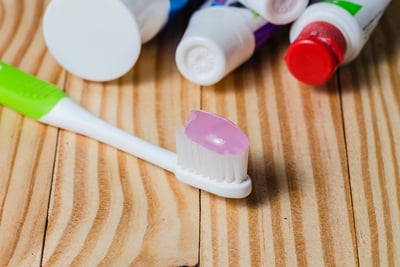
Fluoride toothpastes, sensitive toothpastes, whitening toothpastes, dry mouth toothpastes… With such an array of toothpastes on the market today, choosing the right one for you has become more complicated than ever. However, making a wise choice can be simplified with the following advice.
Brushing with toothpaste is imperative as it effectively removes plaque (bacteria) from the tooth surface and assists in preventing both gum disease and dental decay.
When considering which toothpaste best supports your oral heath, the most important ingredient to look for is fluoride. A mineral found in most toothpastes, fluoride plays an essential role in protecting your teeth.
Using fluoride toothpaste assists in replacing lost minerals from the tooth surface and strengthens the teeth by making them more resistant to acid attack – the main cause of decay. When applied topically through brushing, fluoridated toothpaste is a safe and effective agent for both adults and children. However, children aged 18 months to 6 years of age should use children’s toothpastes, which have a lower concentration of fluoride.
That being said, various advanced toothpastes exist on the market that can offer further specific benefits in addition to fluoride. Dentists and dental hygienists often recommend sensitive toothpaste to patients as an efficient and conservative method to reduce dental sensitivity.
Sensitive toothpaste contains fluoride as well as an active ingredient known as potassium nitrate, which assists in blocking the nerve endings on the tooth and on the root surface. Desensitising toothpastes can provide long-lasting results, but in order to achieve maximum benefits they need to be used on a regular basis. Your dental professional may also advise topical application of the toothpaste to sensitive areas to help strengthen the tooth surface.
Whitening toothpastes are commonly considered by many patients looking to enhance their smiles. These toothpastes contain abrasive ingredients such as silica to help remove from the tooth surface stains caused typically by coffee, tea, red wine and smoking.
When used frequently, whitening toothpastes may well reduce the appearance of stains, causing the teeth to appear whiter; however, they will not actually change the tooth colour. The added abrasives are harsh on the tooth surface and with continual use can actually damage the enamel. To attain your whitest smile, professional whitening options are the safest and most effective on the market.
Specific toothpastes also exist for patients who experience xerostomia – otherwise known as dry mouth. Dry mouth toothpaste works to nourish and moisturise mouth tissues while keeping both the teeth and tissues refreshed. Having a dry mouth can be the result of various factors that adversely affect the oral cavity, causing dental malodour (bad breath) and decay. In conjunction with the use of such toothpastes, it is also important for patients to stay hydrated.
In select cases, patients may be best suited to a prescription-strength or high-fluoride toothpaste, ranging up to 5000ppm in concentration. These toothpastes are specifically used to prevent or arrest dental caries in high-risk patients and are used in a similar manner to regular fluoride toothpastes. High fluoride toothpaste is not available in supermarkets; it can only be purchased through your dentist or by prescription from a pharmacy.
Bearing all these factors in mind, when faced with such an endless number of oral health products on the market, it is best to seek the advice of your dental professional to see what best suits your needs. Your dentist and dental hygienist know your mouth, and they will specify the products best fitting your oral health needs.

